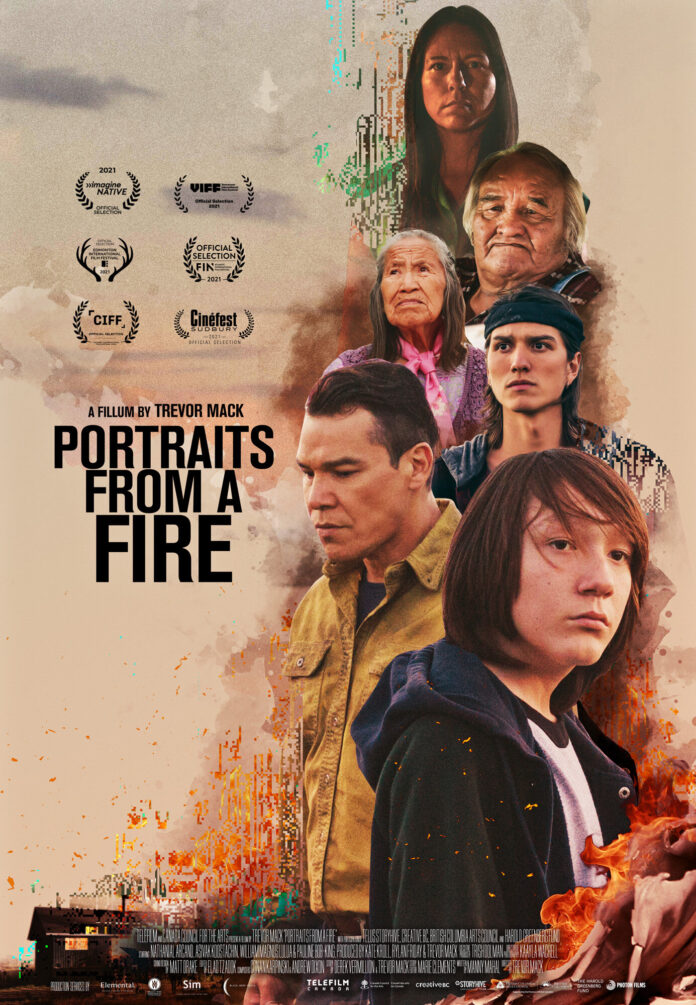Portraits From a Fire, Canadian filmmaker Trevor Mack’s debut feature-length film, is an impactful coming-of-age story about dealing with loss and the need for community and family.
“It’s got everything…it’s got a mix between tragedy, drama, horror, comedy, and stuff like that. And it’s in space.” That’s how the film’s protagonist, Tyler (William Magnus Lulua) — an awkward teenager and aspiring filmmaker living at a Tsilhqot’in reserve with his single father — explains his newest self-made short-film to members of his community. However, this quote is also an effective primer for the rest of Portraits From a Fire (well, maybe without the space part).
The film intersplices Tyler’s home videos with footage of the world around him, consistently switching between the grainy, smaller-square aspect ratio of Tyler’s camcorder and the gorgeous cinematic shots of British Columbia, as photographed by cinematographer Kaayla Whachell.
These camcorder scenes give a unique perspective into Tyler’s character, as it provides a means to both deliver needed exposition for the audience, such as introducing the mystery of Tyler’s family’s past, while also deepening the audience’s connection with Tyler through his personal views and struggles.
This is where William Magnus Lulua — in his first-ever role on screen — stands out. He brings a natural energy to his scenes and effectively portrays the awkward challenges of growing up and gaining confidence, especially when disconnected from his father Gord (Nathaniel Arcand), his sole living immediate family member.
The film does an impressive job of balancing lighter comedic moments with its central mystery and overarching themes of family struggles and loss. This is due, in part, to Mack’s use of found footage that Tyler discovers of his parents — and most critically, his late mother — earlier in their lives, relaying a sense of hope and acting almost as eternalized messages to Tyler from her. These messages, combined with pseudo-flashbacks and pixelated visions of his late mother, often feel as though the thoughts and emotions of the found tapes are blending with Tyler’s real life.
The surrounding characters provide deeper insight into the community and the role it has played in Tyler’s upbringing. Gord, Tyler’s distant father, is clearly stricken by a previous tragedy. While the role sometimes feels overplayed and stereotypical, for the most part Arcand brings enough emotion to sustain intrigue into the family’s backstory and help the audience remain invested in his and Tyler’s relationship.
Another supporting standout is Sammy (Sammy Stump), Tyler’s grandfather, who serves as a crucial role-model for Tyler. While at times used to deliver key emotional beats, Stump shines in the mostly comedic role, with his line readings and running gags leading to multiple laugh-out-loud moments.
As the story dives deeper into Tyler’s family, the dialogue occasionally lets the actors down. During key emotional moments, the exchanges can feel a little on-the-nose and stilted, with actors directly telling instead of showing the audience how they feel. However, as Tyler digs deeper into his family’s past with the encouragement of a new friend, Aaron (Asivak Koostchain), the film is able to maintain its emotional core as it crescendos to a powerful ending. This ending demonstrates both Tyler’s development as a person and provides answers to the tragic mystery of his family’s past.
The direction shines brightest late in the film, as Mack savvily blends its present-day finale with increasingly abstracted flashbacks, distorting footage the audience has already seen and allowing them to understand these memories and visions from an entirely different perspective.
It’s a complicated ending, one with heartbreak and the opening of wounds of loss; however, it also acts as a strong catharsis for Tyler and his father and drives home the themes of the need for family and communal support. While Tyler learns the difficult truths of his family, he is able to find his voice and crucially realizes the power and responsibility he possesses as a storyteller for himself, his family, and his community in the future.
Verdict: While there are some bumps along the road that show its indie stripes, Portraits From a Fire’s balance of humour and important themes makes it easy to recommend. In particular, it is a strong recommendation for filmgoers looking to support Canadian and Indigenous art. Portraits From a Fire is available on all major video on-demand platforms including iTunes.































